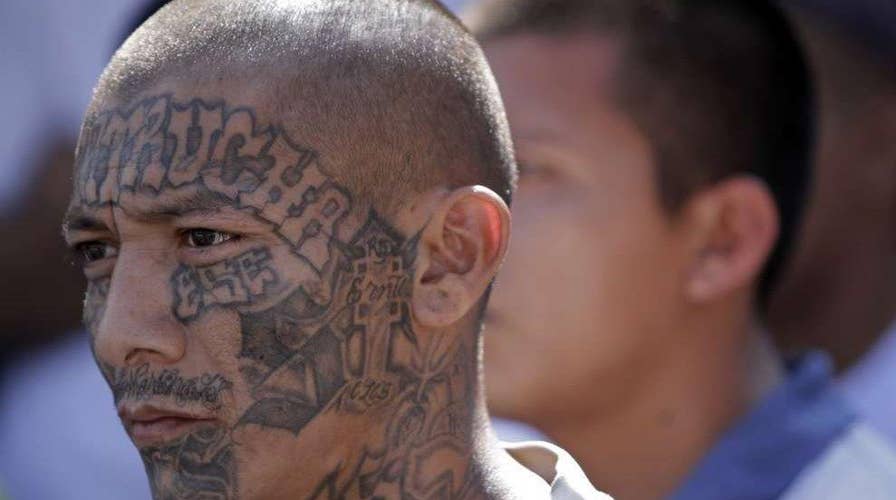The challenges of reining in MS-13
A look back at Tucker's report from Central America on the notorious gang, from the roots of their violence, to the challenges of preventing their migration into the US to Mexico's role #Tucker
Critics of the sanctuary city crackdown say it will chill immigrants from helping ICE go after MS-13 gang members, but the feds say they have plenty of tools – including a change in visa status - to win cooperation from the immigrant community.
The options seem to be paying off, with investigators from ICE’s Homeland Security Investigations saying immigrant cooperation is making a big difference in the fight against the lethal and ruthless MS-13 gang.
In an atmosphere where cooperating with law enforcement is a death sentence imposed by the gang, most illegal immigrants appear to be more concerned about how to obtain legal resident status than financial reward, said one investigator who declined to be identified.
But at the same time, critics warn that the visa tool should be used only sparingly, since it could lead to fraudulent claims.
One of the fierce defenders is Eddy Wang, Section Chief, HSI Contraband Smuggling and Gang Unit, who said, “We wouldn’t be able to close a good number of our cases without the cooperation of the immigrant community.
“Gang members prey on the immigrant community by co-opting their children, exploiting the vulnerable with drugs, and violence. They don’t want to be victims so they work with us.”
What’s more, Wang said, contrary to the public perception that ICE/HSI agents conduct massive sweeps through illegal immigrant communities, they actually reach out to them and explain the options available to let them live without the specter of gang violence.
“We have a very robust victim assistance and community outreach program that informs the illegal immigrant community what their options are for legal resident status if they cooperate with law enforcement,” Wang said.
Among these are asylum, the S visa for witnesses and informants; T visa, which applies to victims of human trafficking; and the U visa, for victims of violence.
According to USCIS spokeswoman Anita Rios Moore, the agency holds webinars for law enforcement and stakeholder groups about the U-Visa and other immigration relief programs.“In the last two years, USCIS has held 21 national webinars for more than 4,000 law enforcement officers, community groups, and practitioners,” she said.
But Jessica Vaughn, Director of Policy Studies, Center for Immigration Studies, cautions against overly promoting the program due to the high risk of fraud and says law enforcement has other options.
“I think it is a good tool if used sparingly to reward people who are critical in especially significant prosecutions, not just as a back-door green card for anyone who has been the victim of a crime,” Vaughn said. “Experience shows when it is promoted, large numbers of people try to use it as a way to stay here, even if they have nothing significant of value to offer in any case.”
Vaughn said people will go so far as to make up stories of being victimized and shop around for a police department that will sign off on the U visa application.
According to Vaughn, ICE often prefers Significant Public Benefit Parole because they have more control over the witness and they can withhold or terminate the benefit if the witness becomes uncooperative or turns out to have nothing worthwhile to help the case. If the U visa were offered instead, they can’t take it back easily and the victim could clam up, leaving them with nothing.
“Any police department can tell you stories of fraudulent victimization claims to try to get the visa,” she said. “I assure you, if there is an appropriate possibility to use it in a gang case, ICE is already on top of it.”
Wang countered by saying fraud is difficult because ultimately law enforcement has to verify and sign off on the victim’s application.
Wang said he was frustrated by what he thought was the distortion of the program by special interest groups, adding the primary role of HSI in fighting crime was to work with victims, regardless of their immigration status, and arrest criminals.
“We don’t check the immigration status of victims or witnesses,” Wang said. “When you politicize public safety there’s no winners, just losers.”
Effective suppression of MS-13 relies heavily on the cooperation of residents in the Central American community and even gang members themselves looking to save their own skin or escape the clutches of a violent culture. But in order to achieve this bond of trust, a viable carrot must be offered.
Wang said HSI is now seeing the fruit of these labors.





















